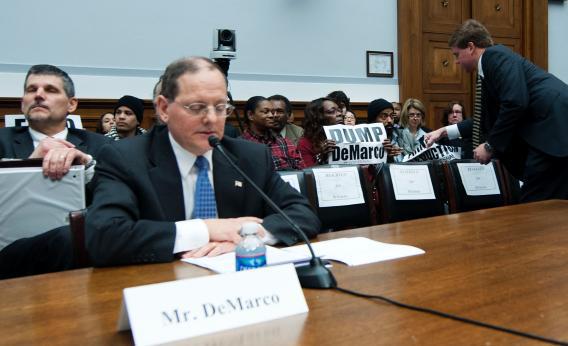Mortgage bundler Freddie Mac announced a $4.6 billion profit in Q2—its sixth profitable quarter in a row—and will be paying a $7 billion dividend to the Treasury this month.
In the real world, dividends from a government-owned company back to the government are meaningless. But according to the slightly perverse accounting mentality that rules the day in Washington, these profits (and similar profits that Fannie Mae has been enjoying as the housing market rebounds) will reduce the deficit and forestall the need to raise the debt ceiling.
The profits also serve as a reminder of the dangers that lurk as we ponder what should be done with Fannie and Freddie. Since they’re strongly profitable right now, there’s going to be a strong temptation to privatize them—keep them as is, and sell the government’s shares to private investors. Since the federal government doesn’t do balance sheet accounting, converting valuable ownership of Fannie and Freddie into cash money is going to make the government’s finances appear much stronger. And the nature of the Fannie/Freddie business model is that you’re all-but-guaranteed to earn a profit most of the time. The business is all about tail risk, and the tail risk is born by the U.S. government which—as we saw in 2008—needs to show up with a timely bailout if things ever get really bad. So given that it’s pretty unlikely there will be an epic house price collapse within the next few years, straightforward privatization is going to be win-win for both investors and politicians looking to the next election or three. It’s some future cohort of politicians who’ll have to clean up the mess during the next bust. And at least in principle you could have a really good run. Fannie and Freddie lasted for decades as lucrative ostensibly private institutions.
Today is not the day for a detailed opinion on what we need in terms of Fannie/Freddie reform. But my lodestar would be that if there’s going to be a federal homeownership subsidy program it should be explicit and on the government’s accounting sheet. Like “we will spend $X per year subsidizing homebuyers”. The rest should be left in private hands. Creating private companies with a public mandate is a recipe for a mess. The fact that the companies are currently profitable is no reason to stop worrying about the mess. If anything, it’s reason to worry that opportunists are about to rush in.
